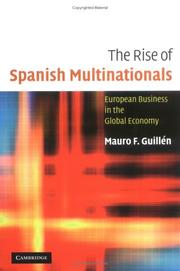| Listing 1 - 10 of 28 | << page >> |
Sort by
|

ISBN: 0691116334 0691057052 1400824206 1283134659 9786613134653 1400814316 9781400814312 Year: 2003 Publisher: Princeton, N.J. ; Woodstock : Princeton University Press,
Abstract | Keywords | Export | Availability | Bookmark
 Loading...
Loading...Choose an application
- Reference Manager
- EndNote
- RefWorks (Direct export to RefWorks)
This book challenges the widely accepted notion that globalization encourages economic convergence--and, by extension, cultural homogenization--across national borders. A systematic comparison of organizational change in Argentina, South Korea, and Spain since 1950 finds that global competition forces countries to exploit their distinctive strengths, resulting in unique development trajectories. Analyzing the social, political, and economic conditions underpinning the rise of various organizational forms, Guillén shows that business groups, small enterprises, and foreign multinationals play different economic roles depending on a country's path to development. Business groups thrive when there is foreign-trade and investment protectionism and are best suited to undertake large-scale, capital-intensive activities such as automobile assembly and construction. Their growth and diversification come at the expense of smaller firms and foreign multinationals. In contrast, small and medium enterprises are best fitted to compete in knowledge-intensive activities such as component manufacturing and branded consumer goods. They prosper in the absence of restrictions on export-oriented multinationals. The book ends on an optimistic note by presenting evidence that it is possible--though not easy--for countries to break through the glass ceiling separating poor from rich. It concludes that globalization encourages economic diversity and that democracy is the form of government best suited to deal with globalization's contingencies. Against those who contend that the transition to markets must come before the transition to ballots, Guillén argues that democratization can and should precede economic modernization. This is applied economic sociology at its best--broad, topical, full of interesting political implications, and critical of the conventional wisdom.
Industrial organization --- Organizational change --- International economic integration. --- Industrie --- Changement organisationnel --- Intégration économique internationale --- Organisation, contrôle, etc. --- Intégration économique internationale --- Organisation, contrôle, etc. --- Argentina --- -Organizational change --- -Industrial organization --- K9410 --- Korea (South) --- Korea: Economy and industry -- organization and systems --- #A0504SO --- Common markets --- Economic integration, International --- Economic union --- Integration, International economic --- Markets, Common --- Union, Economic --- International economic relations --- Change, Organizational --- Organization development --- Organizational development --- Organizational innovation --- Management --- Organization --- Manpower planning --- Industries --- Industrial concentration --- Industrial management --- Industrial sociology --- International economic integration --- Sociology of organization --- Organization theory --- South Korea --- Spain

ISBN: 0226310353 0226310361 Year: 1994 Publisher: Chicago (Ill.) : University of Chicago press,
Abstract | Keywords | Export | Availability | Bookmark
 Loading...
Loading...Choose an application
- Reference Manager
- EndNote
- RefWorks (Direct export to RefWorks)
Comparative management. --- Organizational sociology. --- Gestion comparée --- Sociologie des organisations --- Gestion comparée
Book
ISBN: 9781107402713 1107402719 Year: 2011 Publisher: Cambridge: Cambridge university press,
Abstract | Keywords | Export | Availability | Bookmark
 Loading...
Loading...Choose an application
- Reference Manager
- EndNote
- RefWorks (Direct export to RefWorks)
Entreprise multinationale --- Relations extérieures --- Économie --- Espagne

ISBN: 0521847214 Year: 2005 Publisher: Cambridge ; New York : Cambridge University Press,
Abstract | Keywords | Export | Availability | Bookmark
 Loading...
Loading...Choose an application
- Reference Manager
- EndNote
- RefWorks (Direct export to RefWorks)
Since 1992, Spanish companies in a variety of industries have acquired a prominent presence in the global economy, especially in Latin America and Europe. Companies such as Telefónica, Banco Santander, Repsol-YPF and Inditex (the owner of the Zara brand) have catapulted themselves to become major international competitors, making Spain one of the world's ten largest foreign direct investors. Mauro Guille;n offers not only an explanation of why this has happened, but also an assessment of the economic, financial, political and social consequences for Spain and for Europe. In this analysis, he also addresses the weaknesses of the Spanish multinationals, especially their lack of proprietary technology and their primary focus on Latin America. The book concludes with the argument that the Spanish multinational firms ought to consolidate their European positions through mergers and acquisitions, opening up new possibilities for further expansion in North America and Asia.
Globalisering. --- International business enterprises --- Internationale handel --- Internationale handelsondernemingen --- Spanje --- Spanje. --- Internationale economische relaties. --- Spain --- Foreign economic relations.

ISBN: 9780691116334 Year: 2003 Publisher: Princeton (N.J.) Princeton University Press
Abstract | Keywords | Export | Availability | Bookmark
 Loading...
Loading...Choose an application
- Reference Manager
- EndNote
- RefWorks (Direct export to RefWorks)
Book
Year: 2014 Publisher: New York Routledge
Abstract | Keywords | Export | Availability | Bookmark
 Loading...
Loading...Choose an application
- Reference Manager
- EndNote
- RefWorks (Direct export to RefWorks)
Sociology of the developing countries --- Sociology of the family. Sociology of sexuality --- Sociology of organization --- Economics --- Business management --- Gender --- Management --- Entrepreneurs --- Book --- Economy --- Experiences --- Developing countries
Book
ISBN: 9780691221533 Year: 2020 Publisher: Princeton, NJ
Abstract | Keywords | Export | Availability | Bookmark
 Loading...
Loading...Choose an application
- Reference Manager
- EndNote
- RefWorks (Direct export to RefWorks)
Book
ISBN: 9780812295344 Year: 2018 Publisher: Philadelphia
Abstract | Keywords | Export | Availability | Bookmark
 Loading...
Loading...Choose an application
- Reference Manager
- EndNote
- RefWorks (Direct export to RefWorks)
Book
ISBN: 9781400824205 Year: 2010 Publisher: Princeton, NJ
Abstract | Keywords | Export | Availability | Bookmark
 Loading...
Loading...Choose an application
- Reference Manager
- EndNote
- RefWorks (Direct export to RefWorks)
Book
ISBN: 9781613631157 Year: 2021 Publisher: Philadelphia
Abstract | Keywords | Export | Availability | Bookmark
 Loading...
Loading...Choose an application
- Reference Manager
- EndNote
- RefWorks (Direct export to RefWorks)
| Listing 1 - 10 of 28 | << page >> |
Sort by
|

 Search
Search Feedback
Feedback About UniCat
About UniCat  Help
Help News
News